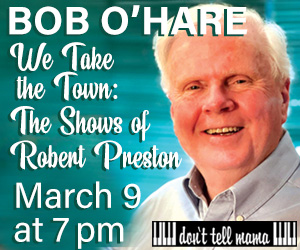Theater review by Stuart Miller…
Before I tell you about “Whore’s Eye View,” Kaytlin Bailey’s insightful and funny one-woman show about the way society has treated sex workers throughout history, let me tell you about Bailey as a performer.
I saw the show’s first preview where it was announced that due to cuts and edits she might need to refer to her script (she didn’t); the stage manager was late and often a step behind Bailey when changing the slides screened on the wall behind her; the audience was vanishingly small (there were four of us, not counting her husband and director Katherine Wilkinson). Yet Bailey was fully present and polished, performing as if she were mid-run before a packed house. So this is both a performer and a show worthy of a much, much bigger audience. But given the short run, I’ll let Bailey’s play speak for itself more than I normally do in most reviews.


Billed as a “mad dash through 10,000 years of history from a sex worker’s perspective,” Bailey’s show touches on Isis, Gilgamesh, Adam and Eve and Lilith (Adam’s first wife); she explains that the word “whore” comes originally from words that meant “one who desires,” or “woman who knows;” whores were the physical embodiment of fertility goddesses until “we started to care, too much I think, about who the Dads are and who should inherit their stuff.”
Initially, there was still a respect for these women who “knew” in the patriarchy.
“If a man wanted to rule, then every year (I swear I am not making this up) then he had to make a priestess prostitute come super hard,” Bailey says. “We’ve had worse systems.”
But gradually women became subjugated and demonized, although in America, of course, racism also played a role in how women and sex were viewed. America’s laws were designed to protect white girls from “pimps, pornographers, abortionists, and the morally corrupting influence of jazz — but not from their husbands… Interracial marriage wasn’t legal until 1967, but marital rape wasn’t a crime until 1993. So if protecting women from sexual violence was the goal… that’s just not what we did.”

Bailey doesn’t mince words but while she hits her points hard, she doesn’t talk down to her audience and her humor and directness make the messages about the dangers posed by our misogynistic patriarchy and Puritanical attitudes toward sexuality feel powerful not preachy.
And while history is the show’s foundation, Bailey’s personal stories form its heart. Her path into sex work came not from deprivation or trauma but from her own desires and curiosity. And she makes personal America’s off-kilter sense that violence is acceptable but sex is bad. (Think of the way we dole out PG and R ratings for our movies.) Much of that imbalance comes from contrasts between her and her father, who she notes “was a war hero, unless you’re Vietnamese in which case obviously it’s more complicated.”
Bailey explains the difference succinctly: “When my father was a young man he was angry, he grew up poor and he was like, “I want to kill people, I don’t want to go to jail, and I would like to make some money.” And we as a society were like, “Of course you do, just fill out these forms.” But when I, at the same age, was like, “I want to have sex, I also don’t want to go to jail, and money looks important.” It was all, “What is wrong with you?”
The military, which is “very good at giving smart ambitious men a place to succeed” provided her father many opportunities but also PTSD in the form of horrific nightmares. Her sex stories are not salacious or even detailed but they clearly had a less detrimental effect.
(That said, the show would benefit from her laying out what she enjoyed and what she disliked about the work itself.)
Bailey’s father relished the story of losing his virginity at 14 to a 27-year-old but society (and her dad) would disapprove of her losing her virginity at 15. “I remember believing that losing my virginity would be this transformative experience, like eating from the fruit of knowledge, or doing acid or something cool.”
It wasn’t that, but, Bailey adds, “I can’t help but wonder what it would be like to live in a society that cared a little bit more about my father’s innocence, and a little less about mine.”
While the show is ostensibly about sex workers, it’s ultimately about the way we treat all women.
“I have learned that people who say they hate whores hate women,” she says. “There is a slipperiness between whore and woman that is woven into our oldest stories and when places say that they’re cracking down on prostitution, they’re actually cracking down on public women.”
In a nation that’s witnessing an epic battle between a presidential candidate who is a woman and another who constantly demeans her and women in general, these ingrained attitudes are certainly worth remembering.
“Whore’s Eye View” is playing at Here Art Center through October 27th. It runs 70 minutes.
Photos: Ashleigh Ann Gardner

